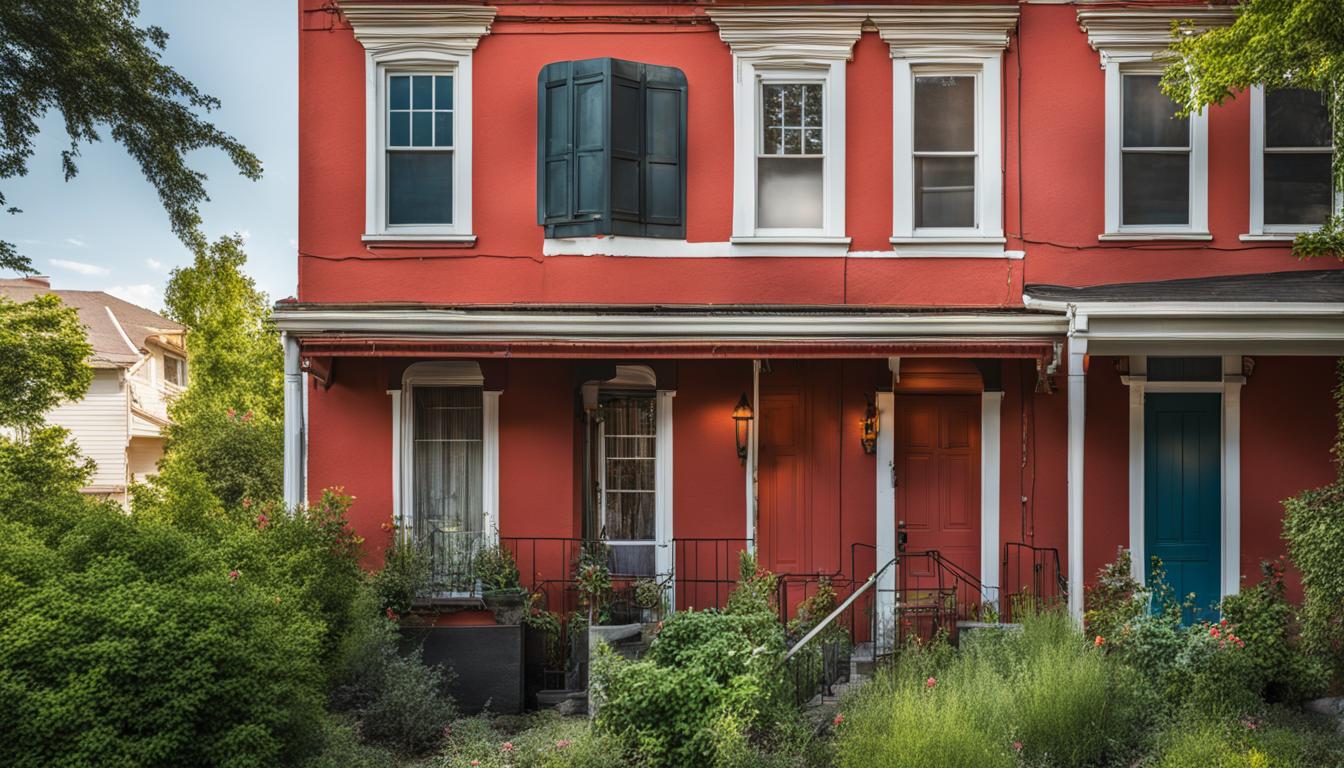Are you a first-time homebuyer looking to save thousands of dollars on closing costs? Look no further! In this article, we’ll share valuable tips and tricks on how to make the most of cash-back mortgage options. By following these expert tips, you can potentially save up to $30,000 on your closing costs!
Key Takeaways:
- Comparing mortgage rates can save you hundreds of dollars in interest
- Explore local programs for grants and lower interest rates
- Maximize savings with a cash-back mortgage
- Research and understand FHA loan closing costs
- Prepare and save for buying a home
The Importance of Comparing Mortgage Rates
When it comes to buying a home, one of the most important factors to consider is the mortgage rate. Comparing mortgage rates from different lenders is crucial in finding the best deal and saving money in the long run. By taking the time to compare lenders, homebuyers can potentially save thousands of dollars over the course of their mortgage.
According to a report by Freddie Mac, comparing rates from five different lenders can save borrowers an average of 0.17% on their interest rate. This may not seem like a significant amount, but it can actually translate to substantial savings. For example, on a 30-year mortgage, this could result in savings of $430 in the first year alone and a total of $9,200 over the life of the loan.
Comparing mortgage rates can be done easily online with the help of mortgage comparison tools. These tools allow homebuyers to input their financial information and compare rates from multiple lenders side by side. By doing so, they can easily see the difference in interest rates and determine which lender offers the most favorable terms.
Benefits of Comparing Mortgage Rates:
- Save money on interest over the life of the loan
- Lower monthly mortgage payments
- Increase bargaining power when making an offer on a home
- Find the best lender with the most favorable terms
Overall, comparing mortgage rates is a crucial step in the homebuying process. It allows homebuyers to make informed decisions, save money, and ensure that they are getting the best mortgage deal possible. By taking the time to compare lenders, homebuyers can set themselves up for long-term financial success and enjoy the benefits of homeownership.
Maximizing Savings with a Cash-Back Mortgage
When it comes to buying a home, one of the biggest expenses is the mortgage. However, by choosing a cash-back mortgage option and comparing rates, homebuyers can maximize their savings and potentially save thousands of dollars in the long run. With a cash-back mortgage, borrowers receive a certain percentage of their mortgage amount back as cash upon closing, providing them with extra funds that can be put towards various financial goals.
One way to make the most of these savings is by using the money saved on interest to build an emergency fund. An emergency fund is essential for unexpected expenses or financial setbacks, providing a safety net that can help homeowners avoid going into debt. Additionally, the savings from a cash-back mortgage can also be invested in high-yield savings accounts or certificates of deposit, which offer higher returns over time compared to traditional savings accounts.
Another option is to contribute the savings towards an individual retirement account (IRA). By investing the funds in an IRA, homeowners can benefit from potential tax advantages and allow their savings to grow over time. This can result in a significant amount of wealth by the time the mortgage is paid off, providing financial security for the future.
Table: Comparing Savings Opportunities
| Savings Opportunity | Description |
|---|---|
| Building an Emergency Fund | Utilize the savings from a cash-back mortgage to create a financial safety net for unexpected expenses or financial setbacks. |
| Investing in High-Yield Accounts | Put the savings towards high-yield savings accounts or certificates of deposit that offer higher returns over traditional savings accounts. |
| Contributing to an Individual Retirement Account (IRA) | Invest the funds in an IRA to benefit from potential tax advantages and allow the savings to grow over time, providing financial security for the future. |
By considering these savings opportunities and making strategic decisions with a cash-back mortgage, homebuyers can not only secure a low-interest mortgage but also optimize their financial goals and potentially build long-term wealth.
Local Programs for First-Time Homebuyers
First-time homebuyers have access to a variety of local programs that can help make the dream of homeownership a reality. These programs, offered within each state, provide assistance with down payments and offer special tax breaks and lower interest rates. By taking advantage of these programs, first-time homebuyers can significantly reduce the upfront costs of buying a home and make homeownership more affordable.
Grants
One of the key benefits of local programs is the availability of grants for first-time homebuyers. These grants provide financial assistance that can be used towards a down payment or closing costs. Depending on the program, the grants may be provided as a one-time payment or as a forgivable loan that is forgiven after a certain number of years of living in the home. These grants can make a significant difference in affordability, allowing homebuyers to secure their dream home with less financial strain.
Tax Breaks
In addition to grants, local programs often offer special tax breaks for first-time homebuyers. These tax breaks can help reduce the overall cost of homeownership by lowering property taxes or providing deductions for mortgage interest. By taking advantage of these tax breaks, first-time homebuyers can save money each year on their tax bill, making homeownership more financially feasible.
Lower Interest Rates
Local programs may also offer first-time homebuyers the opportunity to secure lower interest rates on their mortgages. These lower rates can result in significant savings over the life of the loan, reducing the amount of interest paid over time. By accessing these lower interest rates, first-time homebuyers can save money and make their dream of homeownership more affordable.
Determining Your Down Payment
When buying a home, one of the crucial factors to consider is determining your down payment. While it may not be possible for everyone to make a large down payment, it is important to contribute as much as you can while maintaining your current financial security. A larger down payment results in a smaller loan size, which can reduce overall interest payments and monthly mortgage payments.
It is essential to strike a balance between affordability and financial security when deciding on your down payment amount. While putting down a larger amount will save you money in the long run, it is important to set aside enough funds for expenses such as closing costs and future home maintenance.
To determine the ideal down payment amount, assess your financial situation and set a realistic goal based on your resources. Consider your monthly budget, future financial goals, and the potential impact of a larger down payment on your overall financial well-being. By carefully evaluating these factors, you can make an informed decision that aligns with your financial goals and provides a solid foundation for homeownership.
Table: Down Payment Percentages and Loan Amounts
| Down Payment Percentage | Loan Amount |
|---|---|
| 5% | $475,000 |
| 10% | $450,000 |
| 20% | $400,000 |
| 25% | $375,000 |
Understanding FHA Loan Closing Costs
When considering an FHA loan, it is essential to understand the closing costs involved. Closing costs are the fees and expenses that borrowers pay when finalizing their mortgage. These costs can vary depending on factors such as the loan amount, location, and lender. To estimate and plan for these expenses, homebuyers can use an FHA loan closing cost calculator.
An FHA loan closing cost calculator is a valuable tool that helps homebuyers estimate the total closing costs. It takes into account various fees, including lender fees, third-party fees, and prepaid items. By using the calculator, homebuyers can get a better understanding of the expenses they can expect to pay at the closing table.
It is important to note that eligibility requirements for FHA loans may also impact the closing costs. FHA loans have specific guidelines and criteria that borrowers must meet to qualify. By understanding these requirements, borrowers can determine their eligibility and the potential costs associated with the loan.
How to Save on FHA Loan Closing Costs
When purchasing a home with an FHA loan, it’s important to consider the closing costs involved. These costs can add up and have a significant impact on your upfront expenses. However, there are several strategies that homebuyers can employ to save on FHA loan closing costs.
Negotiating with the Seller
One effective way to save on closing costs is by negotiating with the seller. You can ask the seller to cover some or all of the closing costs as part of your offer. This can help reduce your out-of-pocket expenses and save you money.
Using Gift Funds
FHA loans allow for the use of gift funds towards closing costs. If you have family or friends who are willing to contribute towards your closing costs, you can use these funds to lower your expenses. Make sure to follow the FHA guidelines for using gift funds and document the source of the funds.
Rolling Costs into the Mortgage
Another strategy is to roll some of the remaining closing costs into your mortgage. This means adding the closing costs to your loan amount, which can result in a slightly higher monthly payment. While this may increase the overall cost of the loan, it can help you save on upfront expenses.
By employing these strategies, homebuyers can significantly reduce their FHA loan closing costs and make the homebuying process more affordable.
| Strategy | Potential Savings |
|---|---|
| Negotiating with the Seller | Varies depending on the seller’s willingness to cover closing costs |
| Using Gift Funds | Reduces out-of-pocket expenses by the amount of gift funds |
| Rolling Costs into the Mortgage | Saves upfront expenses but may increase the overall cost of the loan |
“By negotiating with the seller and using gift funds, homebuyers can significantly reduce their FHA loan closing costs and save money during the homebuying process.”
Steps to Prepare for Buying a Home
Preparing for the homebuying process involves several important steps that can help you make informed decisions and ensure a smooth experience. By taking the time to understand your finances, budget effectively, and research mortgage options, you can position yourself for success when buying a home.
Understanding Your Finances
Before embarking on the homebuying journey, it’s crucial to have a clear understanding of your financial situation. Start by assessing your debt-to-income ratio (DTI), which is a measure of your monthly debt payments compared to your gross monthly income. Lenders typically look for a DTI of 43% or lower, but aiming for a lower ratio can help strengthen your financial profile as a borrower.
Additionally, take stock of your current savings and assets, as these will play a significant role in determining your down payment and overall affordability. Consider factors such as your credit score, employment history, and any outstanding debts that may impact your ability to secure a mortgage loan.
Creating a Budget
Establishing a realistic budget is essential for determining how much you can afford to spend on a home. Begin by analyzing your monthly income and expenses, including fixed costs like rent or mortgage payments, utilities, transportation, and groceries. From there, allocate a portion of your income towards saving for a down payment and other homeownership costs.
Automating savings can be an effective strategy to ensure consistent progress towards your savings goals. Set up automatic transfers from your checking account to a designated savings account to build up your down payment funds over time. By adhering to a budget and automating savings, you can stay on track and increase your purchasing power when the time comes to buy a home.
Researching Mortgage Options
When it comes to mortgages, knowledge is power. Take the time to research different types of mortgage loans and understand the options available to you. Consider factors such as interest rates, loan terms, and eligibility requirements to determine which type of mortgage best fits your needs and financial situation.
In addition to traditional mortgages, there may be specialized programs or assistance available for first-time homebuyers or individuals with specific qualifications. Researching these options can help you uncover potential grants, tax breaks, or lower interest rates that can make homeownership more affordable.
| Steps to Prepare for Buying a Home | Benefits |
|---|---|
| Understand your finances | Get a clear picture of your financial situation and improve your borrowing potential |
| Create a budget | Determine how much you can afford to spend on a home and save for a down payment |
| Research mortgage options | Find the best mortgage for your needs and explore specialized programs for additional benefits |
Saving Money for a Home
Saving money for a house is a crucial step in the homebuying process. It requires careful budgeting and automated savings to help you reach your down payment goal. By following these strategies, you can make your dream of homeownership a reality.
Making a Budget
Creating a budget is the first step towards saving for a house. Evaluate your income and expenses, and identify areas where you can cut back. Allocate a portion of your monthly income strictly for savings. Use the 50/30/20 rule as a guide: allocate 50% of your income towards needs, 30% towards wants, and 20% towards savings. By adhering to a budget, you can save more efficiently and stay on track towards achieving your down payment savings goal.
Automating Savings
Automating your savings is another effective strategy to reach your down payment savings goal. Set up an automatic transfer from your checking account to a dedicated savings account each month. This way, you won’t have to worry about manually saving the money, and it will grow steadily over time. Consider opening a high-yield savings account to maximize your savings with higher interest rates.
Additional Tips
Here are some additional tips to help you save for a house:
- Reduce unnecessary expenses, such as eating out or subscription services.
- Consider selling unwanted items or starting a side hustle to generate extra income.
- Take advantage of cash windfalls, such as tax refunds or bonuses, to boost your savings.
- Stay motivated by tracking your progress and celebrating milestones along the way.
Remember, saving for a house requires discipline and commitment. By implementing these strategies and staying focused on your goal, you can make significant progress towards saving for a down payment.
Additional Costs to Consider
When purchasing a home, it’s important to factor in the additional costs that go beyond the down payment. These costs can significantly impact your budget and should be taken into account to ensure that you are financially prepared for homeownership. Some key additional costs to consider include:
Closing Costs
Closing costs are fees associated with the completion of the real estate transaction. They typically include expenses such as lender fees, third-party fees, and prepaid items. Examples of closing costs may include appraisal fees, title insurance, attorney fees, and the cost of credit reports. It’s essential to budget for these costs to avoid any surprises at the closing table.
Moving Costs
When moving into a new home, there are various expenses to consider. These may include hiring professional movers, renting a moving truck, or purchasing packing supplies. It’s important to plan ahead and budget for these costs, as they can add up quickly.
Repairs and Renovations
After purchasing a home, there may be necessary repairs or desired renovations to consider. This can include anything from fixing plumbing issues to updating the kitchen. It’s important to budget for these costs and prioritize which repairs or renovations are most urgent or important.
Property Taxes
Property taxes are another ongoing cost to factor into your budget. The amount you pay in property taxes will depend on the location and value of your home. Property taxes are typically paid annually or semi-annually and can fluctuate over time. It’s crucial to research and understand the property tax rates in your area to accurately budget for this expense.
Private Mortgage Insurance
If you are putting down less than 20% as a down payment, you may be required to pay private mortgage insurance (PMI). This insurance protects the lender in the event that you default on your loan. PMI is an additional monthly expense that can add to the overall cost of homeownership. It’s important to factor in this cost when determining your budget.
By considering these additional costs, you can ensure that you are financially prepared for homeownership and avoid any unexpected financial strain. Proper budgeting and planning can help make the homebuying process smoother and more manageable.
Conclusion
As you embark on your homebuying journey, remember these important tips to maximize your savings and make the process as smooth as possible. Comparing mortgage rates from different lenders is key to finding the best deal and saving money on interest over the long term. Additionally, exploring local programs for first-time homebuyers can provide grants, tax breaks, and lower interest rates, making homeownership more affordable.
Consider opting for a cash-back mortgage option and compare rates to further maximize your savings. The money saved on interest can be used to build an emergency fund or invested in high-yield savings accounts or certificates of deposit, allowing your funds to grow over time. Finally, understanding FHA loan closing costs and implementing strategies to save on those costs can help optimize your finances.
Remember, preparation is crucial. Understand your finances, create a budget, and automate your savings to save for a down payment. Research different mortgage options and consider your potential monthly mortgage payments to ensure you are financially prepared. By following these tips and seeking mortgage advice when needed, you’ll be well-equipped to become a successful homebuyer and achieve your homeownership dreams.
FAQ
What is the importance of comparing mortgage rates?
Comparing mortgage rates allows homebuyers to potentially save hundreds of dollars in interest in the first year alone. It can lead to long-term savings and increase bargaining power when making an offer on a home.
How much can I save by comparing mortgage rates?
According to a report by Freddie Mac, comparing rates from five lenders can save borrowers an average of 0.17% on their interest rate. This can amount to savings of $430 in interest in the first year and a total of $9,200 over a 30-year mortgage.
How can I compare mortgage rates?
Comparing lenders can be done online with a mortgage comparison tool or by visiting lender websites.
Are there any local programs for first-time homebuyers?
Yes, many states offer grants and lower interest rates for down payments to first-time homebuyers. It is worth exploring local programs in your state to make homeownership more affordable.
How much should I aim for as a down payment?
It is essential to put down as much as you can while maintaining your current financial security. A larger down payment will result in a smaller loan size, which can reduce overall interest payments and monthly mortgage payments.
What are the closing costs associated with FHA loans?
The closing costs for FHA loans include lender fees, third-party fees, prepaid items, and upfront mortgage insurance premiums (MIP) and ongoing premiums.
How can I save on FHA loan closing costs?
Strategies to save on FHA loan closing costs include negotiating with the seller to cover some or all of the costs, using gift funds to lower expenses, and potentially rolling some of the closing costs into the mortgage.
How can I prepare for buying a home?
It is important to understand your financial situation by assessing your debt-to-income ratio (DTI) and lowering or eliminating debt. Creating a solid budget, automating savings, and researching mortgage options will also aid in the preparation process.
How can I save money for a home?
Saving money for a home involves creating a budget, automating savings, and using strategies such as selling unwanted items or starting a side hustle to boost savings.
What other costs should I consider when buying a home?
In addition to the down payment, homebuyers should budget for closing costs, moving costs, potential repairs and renovations, and ongoing costs such as property taxes and private mortgage insurance.
Source Links
- https://www.nerdwallet.com/article/mortgages/save-10k-on-your-mortgage
- https://www.sofi.com/learn/content/how-to-save-money-for-a-house/
- https://www.sofi.com/learn/content/fha-home-loan-closing-cost-calculator-table/






